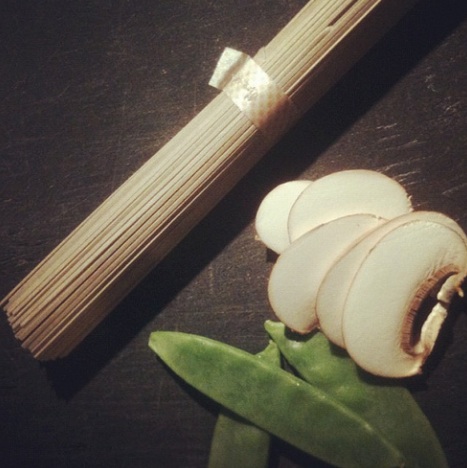
1.
My hapa family was a case study in class decline. It was a slow slide from the upper middle class down to the sandbox of the lower middle class (and beyond). After my parents got divorced, we took turns living in poverty like it was some radical social experiment. But regardless of who was poor, we always celebrated Christmas on the dinner table. Our gifts were modest, laser-targeted, and basic: Russian novels and Little Prince calendars, stacks of socks, three-pair sets of underwear, a wool sweater with burgundy fringe, bundles of incense, boxes of Turtles, and booklets of lifesavers. Occasionally, someone threw in tan sheepskin slippers, a shitty Drum’N’Bass CD for my lame electronic collection, a cheap juicer for my brother, a kid’s turtleneck covered in squiggly lines for obāsan’s 4’10” frame. Once, there was even a tacky marriage proposal written in Times New Roman block letters on white paper for my Mom. But these things were exceptional. The highlight of our holidays was always the food.
2.
Our dinners were sumptuous, miraculous, and multicultural: Sukiyaki and osushi one night, Yorkshire pudding and rosemary lamb the next. One holiday with her second husband it was New Zealand clams, unagi, Waldorf salad, and shrimp shumai. Five years later with her third husband it was vegetarian taco salads or miso shiru. The next day it was ocha (green tea) and goma-ae (a fresh spinach salad topped with soy sauce, bonito shavings, and furikake seasoning). My Mom had a legendary ability to reify homemade spaghetti and soy meatballs out of an empty fridge. The next evening my brother and I might discover sashimi plates on the dining room table the size of NBA basketball courts. As a family, we never had enough money to eat well for Christmas dinner and tune my Kawai piano. My Mom never made enough money to help me get fillings for my cavities. But with credit cards, we could celebrate the imperfection of our class nostalgia and perform miracles together on the stovetop that transformed tabletops into Bloomsburg exhibitions. Creating art for art’s sake, my family combined elements of texture and taste with the mechanics of color theory. There was a flower arrangement to our entrées, a harmony of light and darkness inside the dining room, a small ceremony for the chilled chickpeas and sun-dried tomatoes, crisp Arugula salads, haunting ginger slices and incinerating Thai soups, that was uniquely Japanese in spirit and decor.
3.
Our appetite was the way we survived each new boyfriend our Mom invented in her laboratory of isolation, the way we coped with each drinking relapse my brother suffered on the holidays until he finally came clean. Food was consolation for each new wave of disappointment, self-destruction, and heartbreak. We were a family still consumed in the self-corroding memories of small town Michigan where we once lived together in another world where I used to translate obāsan’s orders at Big Boy’s during lunch even though she was speaking in English. We were a family that had learned to sublimate its sadness into its sensuality, we transformed our hunger for affection into the things we could not put into words, into the things we could not consume, into the things we couldn’t swallow whole.
4.
My immediate family had always been a loud and passionate mess and obāsan was the quiet ballast. Her habits never changed. She made miso shiru and instant coffee almost every day of her life in America. She called her sisters every Japanese New Years. She drove to Mrs. Kurtz’s house for piano lessons and then to Tom’s supermarket every single Saturday. When my Mom finally talked obāsan into moving to southern California with her, she died three years later of lung cancer, leaving behind a cultural heritage I’m still skimming with a soupspoon.
5.
Today, my lunch made me feel closer to my obāsan. I ate medium grain rice with wasabi furikake, unagi, and miso shiru. As I ate these things, I thought instantly of her laugh. The way her eyes disappeared, eaten up by a wet brilliance that mirrored a full lacquer bowl. I thought of the last week of her life, when Wick and I fed her things she could no longer swallow just because she wanted to taste this fleeting world one last time. We stuck tiny slivers of unagi and spoonfuls of miso broth in her mouth. And when her eyes wrinkled at the corners, we dislodged fragments of tofu and eel from her gums like fearless dental assistants. It didn’t matter that she couldn’t swallow anything anymore except the sunlight coming through the blinds. My brother and I understood how food redeems even the weariest spirit for a moment. Food was the only thing we could take for granted in a family of translators, escape artists, shipwrecked swimmers, and circus freaks.
6.
As I stirred the foggy broth in my bowl, I felt close to my grandmother. Miso was my comfort food, my séance, my tool of prophecy. Somewhere between the tiny islands of bean curd, the powdery clouds of fermented soybean paste, and the small reefs of kombu lies obāsan’s legacy, hidden in the metaphysical flotsam of my family. We were like a group of shipwrecked refugees, swimming to a warm shoreline before the light disappeared behind a cloud. We were always swimming, lapping back and forth from the shipwreck to the island. We’ve always been a family of brutish swimmers, stopping just to taste the sun melting on our tongues. We’ve always been unelected children of the brine.

